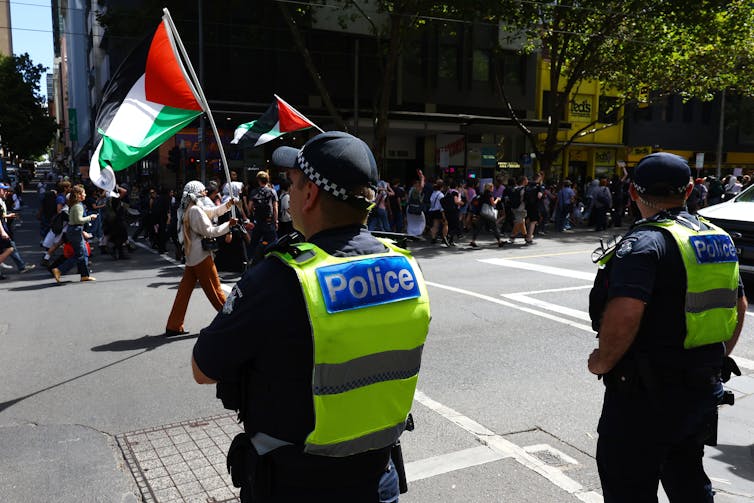Students have been protesting on university campuses across Australia for several weeks now, calling on their institutions to cut ties with weapons manufacturers supplying arms to Israel. Some have noted their intention to stay for months if necessary.
So far, these protests have been largely peaceful. But there have been concerns about student safety. And universities have become increasingly concerned about some of the terms used by some protesters.
Last week, some university leaders sought advice from Attorney-General Mark Dreyfus about whether they should act to remove protesters (Dreyfus replied that he did not provide legal advice).
Police in Victoria have also expressed concerns about the camps escalating into violence.
This raises important legal questions: what does the law say about protests at universities and at what point could either the police or university authorities remove protesters from their campuses?
Freedom of speech and the right to protest
The right to protest – made up of the freedom of speech and assembly – is a central component of a functioning democracy.
Australian universities are a part of this structure as they are established to facilitate learning, knowledge and debate. Additionally, many universities recognise they should promote critical and free enquiry, informed intellectual discourse and public debate.
Most universities in Australia are public institutions and campuses are open to the public. So students and non-students are permitted on university land to protest.
However, the right to protest is also subject to limitations in human rights law. First, the right to protest is limited to peaceful assemblies.
The United Nations has clarified that the right of peaceful assembly cannot be exercised using violence. This includes acts such as physical force against others that is likely to result in injury or death or serious damage to property.

What about hate speech?
But what about the use of hate speech on campuses? Would this be grounds for closing down the protests? There has been concern about the use of terms such as “intifada” during the protests and phrases such as “from the river to the sea”.
In my view, it would be unlawful under human rights law to close down an entire protest simply on the basis that some protesters are using that language.
Human rights law requires limitations on protests to be reasonable and proportionate. Removing entire encampments could be considered a disproportionate response in this case.
How could individuals respond?
Some Jewish students say they do not feel safe on campuses where these protests are happening.
Individuals can lodge complaints to federal and state human rights commissions about the use of hate speech.
For example, section 18C of the federal Racial Discrimination Act makes it unlawful as a civil matter to “offend, insult, humiliate or intimidate” a person in public on grounds of their race, colour, national origin or ethnicity.
Individuals can make a complaint to the Australian Human Rights Commission, which will investigate the allegation and conduct a conciliation process.
But it does not constitute a criminal offence, which would be grounds to remove the entire protest.
How could police respond?
The powers of police to deal with protests is governed by different state and territory laws. But, generally, police have powers to deal with breaches of the peace and other public disorders.
For instance, in New South Wales, police have special powers to respond to “a riot or other civil disturbance that gives rise to a serious risk to public safety”. Criminal offences such as property damage, assault and physical violence would also allow the police to intervene. So, police could intervene in the protests when criminal acts are taking place.
However, the police would still be expected to react with a proportionate response, and criminal offences by a few protesters would not warrant the removal of the entire encampment.
On top of this, police in the Australian Capital Territory, Victoria and Queensland would be required to consider the human rights charters that exist in those jurisdictions.

At what point could universities limit the protests?
The power of universities to intervene is more complicated. This is because Australian public universities are established under federal and state legislation and so they are not wholly private institutions. This means they are not free to stop people coming onto their property in the same way that a private company is.
But as a place of work, they also have legal obligations to ensure the safety of all people who work and study at their campuses.
In addition, most have academic freedom policies where they commit to allowing freedom of speech on campuses, as well as codes of conduct governing appropriate behaviour, which would apply to staff and students participating in the protests.
So, university heads would need to consider the complexities of all of these laws and policies in planning any intervention.
Essentially, the power of universities to intervene would depend on the nature of the protests.
For example, if the protests are disrupting classes or exams, this would not be grounds to remove the entire encampment, but may empower the university to ask the protesters to move to an area that is less disruptive. Importantly, universities in the ACT, Victoria and Queensland would be obliged to act in accordance with their human rights charters and not act disproportionately when dealing with protesters.
On a practical level, given the numbers of protesters involved, universities would probably need police to help disperse them. They do have university security, but not at the levels required to move protesters safely.
So, if there is going to be any limitation or removal of the protests in a lawful manner, it needs to happen only where necessary, reasonable and proportionate to do so.

